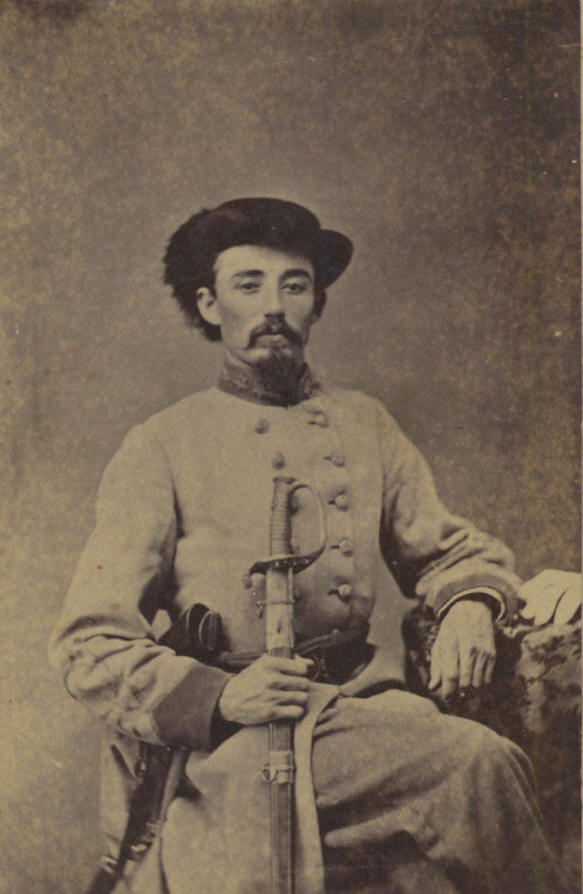| Col. Dudley W. Jones Camp
|
| United Confederate Veterans |
| Camp Number 121 |
| |
|
The organization known as the United Confederate Veterans was formed in
New Orleans, June 10, 1889. The inception of the idea for a large and
united association is credited to Colonel J. F. Shipp, a gallant
Confederate, commander of N. B. Forrest of Chattanooga, Tennessee-the
third organized-who was in successful business for years with a Union
veteran. Colonel Shipp had gone to New Orleans in the interest of the
Chattanooga and Chickamauga Military Park, and there proposed a general
organization of Confederates on the order of the Grand Army of the
Republic, his idea being to bring into a general association the State
organizations, one of which in Virginia, and another in Tennessee, had
already been organized. |
|
|
|
 |
|
Col. Dudley W. Jones |
| |
|
D.W. Jones was the grandson of Jesse Jones, a pioneer
of the Northeast section of Texas and one of the first settlers of that
part of the State, now known as Lamar county. He was the son of
Henry Jones and Martha Heron Jones, who came to Texas and settled in
Lamar county in the year 1836, and in 1840, removed to Titus county and
settled on a farm, three miles from Mt. Pleasant, where Dud W. Jones was
born (1840). He was the second son of a family of five children -
two girls and three boys, none of whom are now living. The only
member of the family now living is a half sister - Mrs. Mattie E.
Nugent, who now resides on the old Henry Jones homestead, near Mt.
Pleasant, Texas, and from whom these dates are learned. His early
education was from his mother and the common schools. After he
grew up he attended a school at Coffeeville, Texas, known as the Murray
Institute, which was at that time one of the best, if not the best,
school in that part of Texas. He left school to enlist as a
private soldier in the Titus Greys, Company I, 9th Texas Cavalry.
|
|
As a boy, he was studious, and a lovable boy - a
great favorite with his father's slaves, and as if by nature was the
arbitrator among the children of the household and farm. |
| |
After the surrender he traveled over the United
States for about one year and returned to his father's home in 1866, and
was elected to represent Titus county in the convention that framed the
present constitution; removed to Houston in 1867 and entered the
practice of law, in a firm of Jones & Barzizer, and was editing a
paper at Houston, the Vidette, one of Houston's first dailies. He
died of hemorrhage of the bowels, in July 1869, and was buried at
Houston, and his father Henry Jones erected a tombstone at his grave.
|
| As Mrs. Nugent was very small at the time of his
death she remembers but little of him, only that the distance then so
great that he was dead and buried before the family knew of his
sickness. He was appointed Adjutant of the regiment on its
organization and served as such until the reorganization in May, 1862,
and at that time was only 22 years old, but was familiar with all the
duties of a commander of a regiment. |
| |
He was of light complexion, with dark hair and brown
eyes, slim and of good height, 5 feet 10 or 11 inches, and was by habit
scrupulously neat, and very precise in all his communications as well as
dress, "a great ladies man," and much of his diary is given to his
enjoyment with them when not on duty. He was always studious, and
kept his books with him when possible. He established a library
for the 9th and it contained many valuable volumes. In July 1863,
his diary speaks of his loosing his Shakespeare and going back to hunt
it. If this writer should sum up his nature in a few words it
would be: Dress, his pride; books, his glory, and war his
profession, while a soldier. At his death his papers were all
lost, and the only writing now known is the small pocket diary kept by
him from April 1863 to April 1864, and much of it is so finely written
and from exposure to wet weather cannot be read. He was greatly
beloved by his men and considered by his superiors to equal at arms with
any regiment in the service of equal numbers. This writer believes
that he being the youngest Colonel was more restive and more apt to stir
up the enemy
and bring about an engagement. He was brave and generous, and
filled the position he occupied at least, to the satisfaction of the
Department at Richmond as well as his immediate commanders.
|
RECOLLECTIONS OF THE GREAT WAR
BY A.W. SPARKS |
| |
|
.JPG) |
